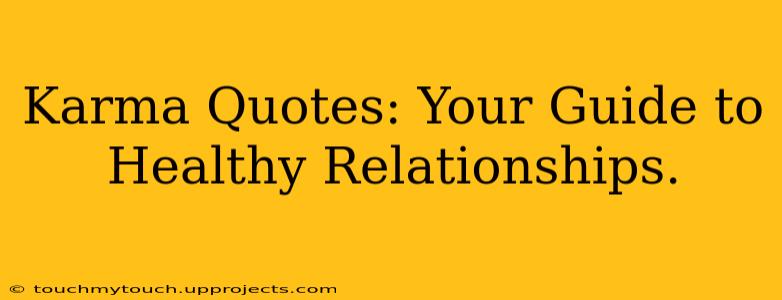Karma. The word itself conjures images of cosmic justice, of actions having consequences, both good and bad. But in the context of relationships, karma isn't just about retribution; it's a powerful lens through which to examine our interactions and build healthier, more fulfilling connections. This isn't about believing in a mystical force handing out rewards and punishments, but rather about understanding the cyclical nature of our behavior and its impact on others. This guide will explore how the principles of karma – action and reaction – can inform our approach to relationships, leading to greater happiness and harmony.
What Does Karma Mean in Relationships?
In essence, the karmic principle in relationships suggests that the energy we put out into the world – the kindness, the cruelty, the honesty, the deceit – will ultimately shape the energy we receive back. It's not a matter of "getting what you deserve" in a punitive sense, but rather recognizing the powerful influence of our actions on the dynamics of our relationships. If we consistently treat others with respect, empathy, and kindness, we are more likely to attract similar treatment in return. Conversely, negativity, selfishness, and dishonesty can create a cycle of conflict and unhappiness.
How Karma Impacts Different Relationship Types
Karma's influence transcends the type of relationship. Whether it's romantic partnerships, family bonds, friendships, or professional connections, the principle of action and reaction remains consistent.
Romantic Relationships:
In romantic relationships, karma plays a significant role. Consistent acts of love, understanding, and support nurture a strong, healthy bond. Conversely, infidelity, manipulation, or emotional neglect can create a cycle of distrust and pain, potentially leading to relationship breakdown. This isn't about blaming one person, but about recognizing the role each individual plays in shaping the relationship's energy.
Family Relationships:
Family dynamics are often complex and deeply ingrained. Addressing past hurts and unresolved conflicts can be a powerful way to break negative karmic cycles. Practicing forgiveness, understanding, and open communication are key to fostering healthier family relationships. Holding onto resentment only perpetuates negativity.
Friendships:
True friendships are built on mutual respect, trust, and support. Just as we cultivate strong friendships through positive actions, we can also damage them through betrayal, gossip, or consistent negativity. Choosing friends who uplift and support us, and reciprocating that support, are key to building strong karmic bonds.
Professional Relationships:
The workplace is another arena where karmic principles apply. Treating colleagues with respect, honesty, and integrity fosters a positive and productive work environment. Conversely, negativity, backstabbing, and dishonesty can lead to strained relationships and a less rewarding work experience.
Common Questions About Karma and Relationships:
How can I break a negative karmic cycle in a relationship?
Breaking a negative cycle requires introspection and a conscious effort to change your behavior. Identify the patterns of negativity, whether it's your actions or reactions. Seek professional help if needed, and commit to making positive changes, even if it’s challenging. Forgiveness, both of yourself and others, plays a crucial role.
Does karma always mean immediate consequences?
No, karmic consequences aren't always immediate. Sometimes, the effects of our actions take time to manifest. The impact may be subtle, or it may be significant, depending on the action and its reverberations. The important thing is to focus on consistently positive behavior.
Can I change my karmic destiny in a relationship?
While we cannot control the actions of others, we can absolutely control our own. By consciously choosing positive actions and behaviors, we influence the energy within our relationships and create a more positive trajectory.
What if my partner doesn't believe in karma?
The principle of karma doesn't require your partner's belief to be effective. Focusing on your own actions and behaviors—being kind, respectful, and communicative—will create a positive ripple effect, even if your partner doesn't understand the underlying philosophy. Their reaction will be influenced by their own choices and beliefs, but your positive energy will undeniably influence the relationship's atmosphere.
Embracing Karma for Healthy Relationships
Ultimately, understanding karma in relationships isn't about blame or punishment; it's about taking responsibility for our actions and their impact. By embracing kindness, honesty, and empathy, we create a positive karmic cycle that nurtures healthy, fulfilling connections. It's a journey of self-reflection and conscious choice, leading to more harmonious and rewarding relationships.
